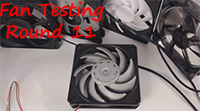Every now and then the discussion comes up in forums where someone gets the idea that they want to run their radiators passively without out any fan power at all. The discussion recently came up again and I decided to dig out some old test data and share a quick blog on what I found back on my V1 test bench while testing a low density double thickness 480 sized radiator.
When I was testing my TFC480 radiator back on my V1 test bench, I tried exactly that. I even dialed down the heat to a bare minimum 100 watts to test a very small (perfect conditions) scenario. The TFC 480 radiator is a premium double thickness low density radiator that performs really well with low speed fans, so I figured it would be the pefect test case.
So I proceeded to use my very smallest heater, and in the optimal open bench setting with the radiator pointing upward proceeded to test at 100W heat load.
1 hour went by….still not stable
2 hours went by…temps still climbing…
Almost 3 hours later, temps are still climbing…The tubing was hot to the touch and I began to worry about my heaters fracturing in their glass tubes and decided to call it quits. This is what that test data log looked like:

FAILED!
I consider an “Average” radiator setup performance to be around a 10C water/air delta and the radiator nearly doubled that on this incomplete test. Perhaps you could get passive to work in a case where you had a power supply pulling air through the case and radiator, but then that’s not really passive is it?
Bottom line, passive operation on conventional radiators just doesn’t work well enough to consider it a useful option. I would ask why bother when 600RPM fans are quieter than a mouse fart anyhow…:)
It would take a very different type of radiator and much much larger surface areas for passive to work well.
Cheers!
Martin


Honestly, i would be aggravated by the whine of my pump if my computer was that silent as my MCP35x would be running full bore the whole time.
“why bother when 600RPM fans are quieter than a mouse fart anyhow”
That is pure speculation on your part Martin, not the scientific way by any means.
I think you should measure the noise of a 600 rpm fan and compare it to the noise of mouse flatulence. 😀
LOL! The kids do have a hamster, never thought about her becoming a test subject…..:)
i don’t think hamsters eat beans…or they’d be helping the CNG sector and averting global warming on a small scale 😛
Mouse fart… Too funny!!! XD
Try using 8 (yes I said 8) 253 CFM Delta fans and 4 Silverstone AP121 Air Chanelling fans all inside one PC case with one 4 rad & one 3 rad. Talk about noise, I’m surprised that this thing doesn’t levitate off the ground. Good thing that I actually have a custom-made PWM fan controller that keeps it at around 1500 RPM on all fans. it’s still a low hum but it’s quite enough for me. I don’t know why people make such a big stink about the noise level when it comes to fans doing around 1500 to 1800 RPM? That’s to be expected especially when you’re using radiators on a PC to water cool you’re equipment…
Once again, great review Martin keep it up!… 🙂
Some people, myself included, are just annoyed by fan sounds. I run Yate D12SL12’s on 7v and my 35x at its lowest speed, so the coils or chokes or whatever in my power supply, motherboard, and graphics card, are the loudest parts in my case.
And with everything that slow, I can still get 4.9GHz completely stable on my 2500k and stay under 65c after 12 hours of prime.
So why bother with high noise levels if you can accomplish that in near silence?
Wow, I’m surprised at the results, TBH. I would have guessed that a passive 480 could handle 100W. I don’t understand anyone’s obsession with passive cooling, though, since as you mentioned sub-800 RPM fans is silent to most people. I have 8 fans that run at an estimated 600-800 RPM and I can’t hear them at all over my PSU fan and D5.
As always, nice work, Martin. It’s appreciated.